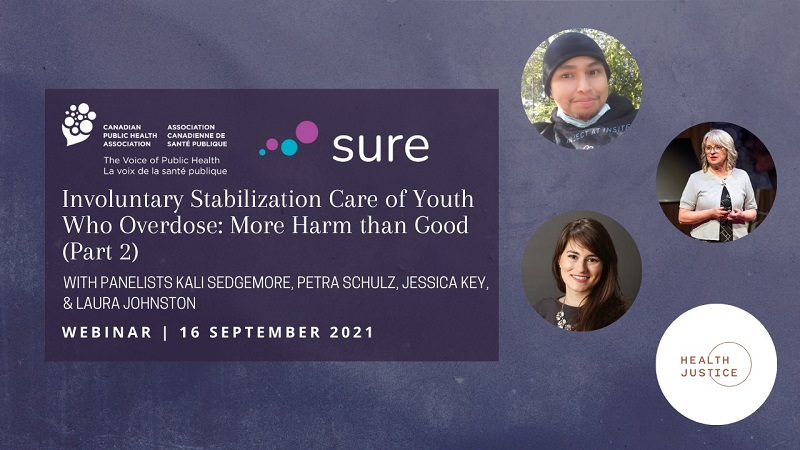In February 2021, the Harm Reduction Nurses Association and CPHA presented a webinar on proposed amendments to British Columbia’s Mental Health Act that would allow for involuntary, hospital-based stabilization care of youth following an overdose (Bill 22), and discussed the potential harms and disproportionate impacts Bill 22 could have on youth and ethical issues associated with detention-based treatment. This follow-up panel discussion broadened the discussion to include additional perspectives from youth, families, advocates and academics. The presentations and discussion highlighted a range of perspectives on involuntary stabilization care and shared insights on efforts to support youth who use drugs.
Laura Johnston (she/her) is a lawyer who has worked primarily in the areas of mental health law and human rights, representing clients with many different forms of mental disabilities and substance use issues. She is currently the Legal Director of Health Justice, a non-profit organization that conducts research, education, and advocacy to improve the laws and policies that govern coercive health care in BC. Laura teaches Mental Health Law in the faculties of law at the University of British Columbia and at the University of Victoria and frequently provides education to legal and medical professionals.
Jessica Key (she/her) is a citizen of the Musgamagw Dzawada̱’enux̱w Nations. She works as a registered nurse towards anti-racist health care and to improve the health care outcomes for Indigenous people accessing care in hospitals. She has a clinical background working with youth with concurrent mental health and substance use challenges. She is also a graduate student in the Master of Science in Nursing program at the University of British Columbia where her research area is Indigenous cultural safety in acute mental health settings, particularly regarding Indigenous youth. Jessica is a founding director of Akala Outdoor Education Society which develops and delivers outdoor education opportunities for youth with a focus on cultural and community connections. Jessica’s nursing practice is rooted in cultural safety, antiracism, and social justice.
Petra Schulz (she/her) lost her 25-year-old son, Danny, to accidental fentanyl poisoning in 2014. She is one of the co-founders of Moms Stop the Harm, a network of Canadian families impacted by substance-use related harms and deaths. Through the lessons learned from her personal experience and by sharing Danny's story, Petra has become an advocate for drug policy reform to reduce the harm associated with substance use. She believes that substance use is a matter involving human rights and health and must not be criminalized. Petra represents families with lived experience in Health Canada and CCSA advisory committees. She has been a speaker for TedX at MacEwan University, at conferences, community meetings, professional organizations, universities, and all government levels. She contributed to the anti-stigma campaign, "See-Beyond" and a research project on mother's advocacy.
Kali Sedgemore (they/them) is peer worker who wears many hats. They are president of Coalition of peers dismantling the drug war (CPDDW). They advocate & fight for drug policy accessibility, particularly for youth specific harm reduction services and education, and fighting to stop bill 22-safe (involuntary) care act from passing into law. Kali is a strong believer in Harm Reduction, drug user rights specifically stimulant users getting voice heard. They believe in a community driving safe supply similar to the events we (CPDDW-DULF) have done a few times now.
In advance of this webinar, we recommend watching our first webinar on this topic, 'Involuntary Stabilization Care of Youth Who Overdose: More Harm than Good (Part 1)', available here.

